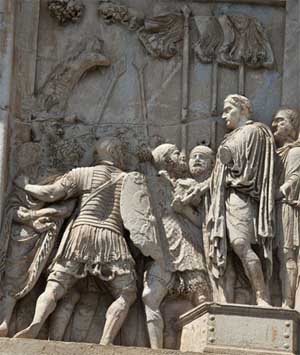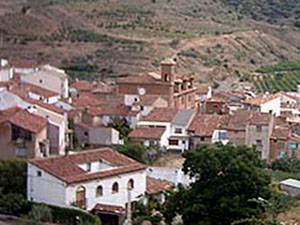 |
Organic Society
Customary Law & Roman Law
Plinio Corrêa de Oliveira
When the Church converted the barbarians, she started to develop in an organic way the juridical elements that were latent in their customs. She helped them develop the explicit laws necessary for them to establish a normal civilized life in either the villages and cities or the countryside, allowing them to have a pacific common life.

The introduction of Roman Law helped barbarians to become more civilized |
At a certain moment in this process of development of their consuetudinary laws, the Church introduced various provisions of Roman Law to the barbarians. In doing this, she somehow harmonized that new world that was emerging with the world from which she had sprung. Indeed, the Apostles and the first Catholics of the Catacombs knew Roman Law. When the Roman Emperors converted, the Roman State to some extent became Catholic.
It happens that Roman Law was the application of Natural Law to the civil sphere, resulting in an ensemble of rules that were in accordance with the Laws of God. One can say that in creating their Law, the Romans followed the vocation God gave them, a vocation that no other people had. The temporal law they made was in its general lines in accordance with the Law of God.
In one of his Epistles St. Paul affirms that God gave philosophy to the Greeks and Revelation to the Jews. It is a way to say that philosophy as such was a gift of God that the Greeks received well and developed. Thus, the Church took a part of Greek philosophy – Aristotle and some of Plato – purified it and incorporated it into her own philosophy. Many centuries later, St. Thomas completed this work.
I believe we could paraphrase that statement of St. Paul saying that God gave Law to the Romans. This would explain why the Church assimilated parts of Roman Law just as she did with Greek philosophy.
One could ask: Was it a good or bad thing to introduce Roman Law into a society governed by customary laws?

A medieval jurist |
I believe that the normal progress of consuetudinary laws supposes the introduction of some elements of Roman Law. Most of the customary laws are related to the life of families, guilds, universities or other intermediary bodies. They are, therefore, laws turned toward the rights of the ensemble, of the community. The organic development of consuetudinary laws, in my opinion, should move toward the protection of the individual, without becoming individualist.
Thus, the social structure based on communitarian customs should evolve to include a juridical structure that protects the individual as well. Insofar as this happens, the legal provisions of Roman Law enter. This is what I consider a normal process of growth.
A harmonic combination of both Laws - consuetudinary and Roman, communitarian and individual - seems to be a highly desirable thing.
The land for the poor in Aragon
We can find a curious example of how both of these laws support each other in Aragon today. In that part of Spain, which was an independent kingdom for centuries, there is a consuetudinary law establishing that a part of the common lands that are cultivated should be set aside for the poor. Any poor person who lives in that locale has the right to go there and take the fruits of the trees and plants that he needs for his own sustenance. He also has the right to collect the dead wood from the ground and take it home to use for heating or cooking.

An Aragon village and countryside with common lands |
This customary law has existed in Aragon for centuries and no one has touched it. No one - neither the municipalities where those lands are located, nor the Aragon State, nor the Spanish Union nor any individual – can touch it. This custom remained intact for centuries.
Recently, however, in a socialist law to implement agrarian reform, the government issued a decree establishing that those lands, like other common lands in Aragon, must be incorporated into a “Land Bank.” These lands will be managed by the State and distributed at its discretion “to help the poor.” It is a clear contradiction since those lands were already helping the poor for centuries. But as Socialism always does, it aims to destroy any remnant of organic society.
So, some Spanish friends of mine who normally fight for the defense of private property, took up the fight in this case to defend that customary communitarian law that favored the poor. They asked the government to revoke that socialist law and instead approve another one protecting the old threatened customary law.
This is an example of how Roman Law should protect customary law when it is endangered by the advances of the Revolution.

Posted June 20, 2011

  | | Prof. Plinio |
Organic Society was a theme dear to the late Prof. Plinio Corrêa de Oliveira. He addressed this topic on countless occasions during his life - at times in lectures for the formation of his disciples, at times in meetings with friends who gathered to study the social aspects and history of Christendom, at times just in passing.
Atila S. Guimarães selected excerpts of these lectures and conversations from the transcripts of tapes and his own personal notes. He translated and adapted them into articles for the TIA website. In these texts fidelity to the original ideas and words is kept as much as possible.

Related Topics of Interest
 Customary Law Is the Charm of a Catholic State Customary Law Is the Charm of a Catholic State
 Definitions, Examples, Nuances of Different Societies Definitions, Examples, Nuances of Different Societies
 Does Authority Represent God or the Sovereign People? Does Authority Represent God or the Sovereign People?
 Leadership Is Not Established by a Social Contract Leadership Is Not Established by a Social Contract
 Inequalities Are the Base and Bond of Society Inequalities Are the Base and Bond of Society
 Groups of Friends and Guilds Groups of Friends and Guilds
 Intermediary Societies Participate in the State Power Intermediary Societies Participate in the State Power
 The Art of Organic Government The Art of Organic Government

Related Works of Interest
|
|
Organic Society | Social-Political | Home | Books | CDs | Search | Contact Us | Donate

©2002-2011 Tradition in Action, Inc. All Rights Reserved
|
 |
|